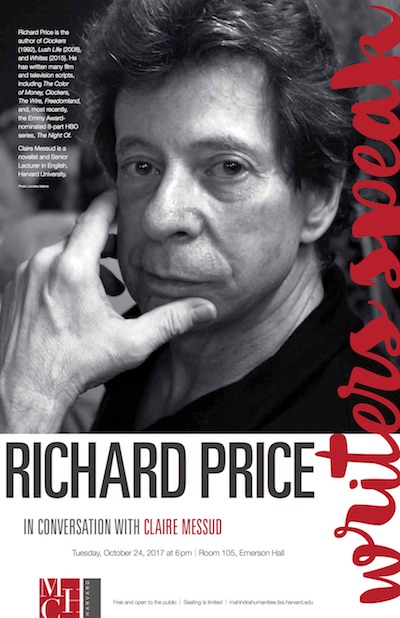Richard Price was in conversation with Claire Messud at Mahindra Humanties Center, Emerson Hall on Tuesday 24th October 2017.
Claire Messud is a Senior Lecturer in Creative Writing (Fiction) in the English Department at Harvard. An award-winning novelist, her most recent book is The Burning Girl. 
Richard Price is a prolific novelist and screenwriter. Brought up in the Bronx, he writes gritty urban crime fiction and drama. His novels include Clockers (1992), Lush Life (2008) and Whites (2015), which he wrote under the pseudonym, Harry Brandt.
He has written numerous film and tv screenplays, including The Color of Money (1986), The Wire (2002) and the Emmy-nominated HBO series The Night Of (2016).
Genre Fiction vs. Literary Fiction
Claire Messud began by observing that very few authors, apart from the likes of John le Carre have been able to break free from being labelled as a writer of genre fiction. If RP took out the dead bodies in his books, he would win every literary prize.
RP explained that he told stories about the working-class neighbourhood he grew up in, and his characters reflected that. If he wrote about middle-class people being mildly unhappy in Connecticut, he might win literary awards.
CM: How are the elements of genre fiction useful to you?
RP: Genre fiction has certain rules. There are bodies in there. There has to be a crime and punishment. And by the end you have to have justice. There is a logic to criminal investigations: they are chronological and orderly.
Creating an authentic story world
CM: Colm Tóibín said that you can make up the characters, or you can make up the plot. You can’t do both.
RP: Place is one of the fundamental elements, and one of the key characters in my stories is location. It’s about writing about the city I grew up in. I can write about urban working class people. And as far as humour is concerned, it comes out of recognising a character trait, a familiarity, rather than by gags. For RP enjoying what you do is fundamental to his work.
CM: To what extent is dialogue difficult for you?
RP: It’s intuitive, I must have an ear for it as it’s definitely something I like to do. It’s about finding your narrative voice. I write in close third person.
On Research
CM: What about research?
RP: I don’t do research. I hang out. I go out to be with these people (the locals and police officers in his neighbourhood). I love to go out and see what happens.
On writing crime
Crime novels have to have both revelations and solutions, and as the writer, you have to get there before the reader figures it out. You have to be one step ahead of them.
The background to writing The Whites and being told to write faster
The Whites was published under a pseudonym, at the suggestion of his agent, who wanted him to finish the book in three months.
RP: How? Write stupider? Write more glibly? You write as fast as you write. How do you write less complex characters? Cut to four years later when he finally delivered the book.
On Writing for Film and TV – collaboration, the mechanics of a screenplay and the differences between a novel and a script.
RP replied to a question from the audience about the mechanics of writing a screenplay:
Screenplays are instructional, like telegrams to the director, or even Post It Notes.
As the screenwriter, you are the first in and the screenplay is a blueprint, not a building. After you write the script, then everyone else involved in the making of the film lands on top of you. As the writer, you don’t have any control over the finished product.
He talked about the experience of working on the Emmy nominated tv series, The Night Of, where he is both writer and an executive producer. The collaborative process is, ‘at best; it’s give and take. At worst, it’s all take.’
You read crime fiction for the narrative voice, central character and sense of time and place. When you’re writing a novel, there is no narrative clock. In a screenplay, you have to know what happens by a certain page number. Film is a two-dimensional medium; it’s both sound and vision. You have to know exactly what you’re writing in a film. It has to be tight and crisp and know where it’s going, (as it’s a commercial project).
The Night Of is currently available on Netflix.
https://dvd.netflix.com/Movie/The-Night-Of/80108584